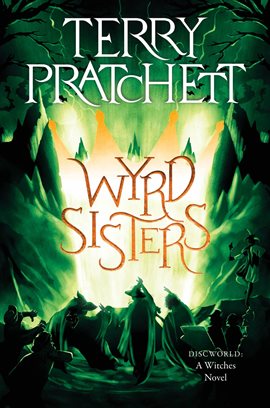You might think I would have a healthier appreciation for Shakespeare, given how many times I watched and rewatched “The Lion King” growing up; the VHS would end, and I would immediately demand it be rewound and restarted. It is a Shakespeare retelling, after all, “Hamlet” specifically. A king murdered by his brother, his son cast out, only to come back and reclaim the throne. Maybe the Disney version is a little lighter and features the voice talents of James Earl Jones and Nathan Lane, but it’s still (mostly) “Hamlet” and sometimes just as dark. But as I entered high school and started reading more from the Bard, I found it difficult to follow characters and plots, and especially the language. Shakespeare has staying power though, and many authors have put pens to paper to revisit, recontextualize, and sometimes just rewrite the stories we know.
If you haven’t read any of the Discworld books before, “Wyrd Sisters” is as great a place to start as any. For science fiction readers, Terry Pratchett can most easily be described as Douglas Adams writing fantasy, although the reverse can also be said. This is by far the most humorous retelling in this post, as Pratchett takes some of the most well-known tragedies by Shakespeare, and turns them on their head.
The witches of the Ramtop Mountains (Granny Weatherwax, Nanny Ogg and Magrat Garlick) normally stay out of the business of politics and kings. But after the king is murdered by his brother and sister-in-law (the Lady Macbeth stand-in), the new king and queen set about collecting tax from the residents of the Ramtops. Witches don’t have to pay tax though, everyone knows that; Nanny Ogg however is arrested for failure to pay, and comes in contact with the king’s ghost while in the dungeons. Starting to feel slightly more like “Hamlet?” Did I mention the baby who is spirited away from the castle at the beginning of the book, along with the king’s crown, destined to usurp the wrongful king? Pratchett was a fantastic writer of satire, both when making clear comparisons to other media or events (pick up “Maskerade” for a critical eye towards “The Phantom of the Opera”), as well as writing about the human condition, and what makes us tick.
I remember picking up “The King of Infinite Space” on a whim; I had heard some good reviews, it was a queer modern-day Hamlet retelling, it just happened to be on the library’s shelf. This book sucked me in and would not let me go.
Benjamin Dane (this novel’s version of “Hamlet”), struggles with depression, further exacerbated by the death of his father, and the news that his mother is already planning on marrying his uncle. Ben is neurodivergent, honest to a fault, and abuses drugs and alcohol as a way to get through the days, but calls on his old friend to help him in his time of need. Horatio Patel (no points for guessing who this is meant to be) is loyal to a fault, and is all too ready to help Ben, even if things between them have been different since one fateful night. Rounding out our point of view characters is Lia, Ben’s ex-fiancé, who is in recovery from addiction and works for a trio of mysterious florist sisters, who teach her the magic and language of flowers.
All of the characters in this novel felt so incredibly alive, including the sleazy ones you wish weren’t. Much of the novel is focused on the relationship between Ben and Horatio, although Lia’s story is mysterious and her character arc is wonderful, if tragic. For as much as this is a Hamlet retelling, it is still based on the play, and it is a tragedy, which is all I can say without spoiling this novel’s take.
I’ll be honest, I had no idea “The Last True Poets of the Sea” was inspired by “Twelfth Night.” Besides the histories, “Twelfth Night” is perhaps the Shakespeare play I’ve had the least exposure to, despite everything about it speaking to my interests.
This young adult novel follows Violet, already something of a party animal, made worse after her younger brother is hospitalized. As much punishment as it is for her parents to focus on Sam, Violet is sent away to Lyric, Maine, to spend a summer with her uncle.
Lyric happens to be the town where Violet’s great-great-great-grandmother was supposedly the only survivor of the wrecked ship Lyric. When Violet gets into town, she befriends a group of teens, including Orion, who works at the aquarium Violet volunteers at, and Liv, who is fascinated by Violet’s family history. Orion has a massive crush on Liv, and so Violet gets roped into helping him learn more about her, with the intention of asking Liv out. Except, as Violet and Liv get closer, Violet discovers she may also be developing feelings for Liv. Oops.
This book runs on the longer side for a contemporary young adult novel, but it’s worth the page count. The conversations about mental health, sexuality, and family are all handled with care, and the mystery behind Violet’s many times great-grandmother keeps the story from getting too bogged down.
Did these Shakespearean retellings make me further appreciate the works of the Bard? Maybe? I think they serve to highlight that while the classics may be considered such for good reason, sometimes a fantastical or more contemporary twist can make the stories more accessible to a wider audience. And perhaps a classroom of high school students reading the plays aloud popcorn-style is not in fact the absolute best way to take them in.
If you’re looking for more “Hamlet” retellings in particular, click here to check out a list of books available from your local library!



